2019 All-America City Finalist – Wichita, KS
Application Summary for the All-America City Awards:
The City of Wichita is committed to considering the perspectives of community members from all racial, ethnic and cultural backgrounds during decision-making processes.
Project Wichita is a community-driven engagement initiative with nearly 100 organizations committed to a regional effort to engage diverse voices and establish a vision, guiding principles, and a 10-year action plan. Based on input from over 14,000 community members, Project Wichita produced a regional vision and action plan focused on the next 10 years. Focus groups offer another, smaller scale opportunity for residents to give feedback. The city schedules these events at times and places most convenient for the participants. Focus groups have discussed the Wichita Parks, Recreation, and Open Space Plan, as well as topics such as health, education, recreation, and business.
Three project examples showing how this community leverages civic engagement, collaboration, inclusiveness and innovation to successfully address local issues:
1.) Wichita Police Department Strengthens Community Bonds
 Because of the controversy in Ferguson, MO over the use of deadly force by a police officer, key figures in Wichita’s minority communities began to mobilize, culminating in a series of local discussions branded as “No Ferguson Here.”
Because of the controversy in Ferguson, MO over the use of deadly force by a police officer, key figures in Wichita’s minority communities began to mobilize, culminating in a series of local discussions branded as “No Ferguson Here.”
During the series of meetings, citizens expressed anger and disappointment in the way their police force interacted with the community, accusing officers of racial profiling and excessive use of force.
Eventually, the discussions formulated four main goals:
1) Requiring body cameras for the police force;
2)Implementing crisis intervention training (CIT) for all officers;
3) Creating an independent review board for officer-involved shootings and allegations of misconduct; and
4) Increasing the culture of community policing.
The Wichita Police Department (WPD) took the claims seriously. Immediate changes included:
- Equipping all of patrol officers with body worn cameras
- Making crisis intervention training (CIT) a priority; now one-third of commissioned officers are certified.
In 2016 Chief Gordon Ramsay arrived and forged ahead with the remaining two goals outlined by the #NoFergusonHere forums. Chief Ramsey agreed to create a civilian review board and revamp how police handled youth on the “gang list,” which has been criticized for being too broad and too difficult to be removed from.
Additionally, Chief Ramsay began the development of the “God Squad,” which is a group of African-American religious leaders who meet regularly with members of the WPD to share information and build partnerships.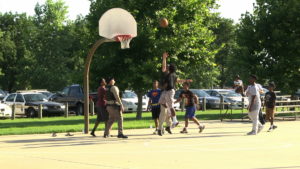
The Department is committed to ongoing relationship building with members of each unique community, ensuring all citizens are treated fairly, equally, and with dignity.
2.) Barriers to Accessing Healthy Foods
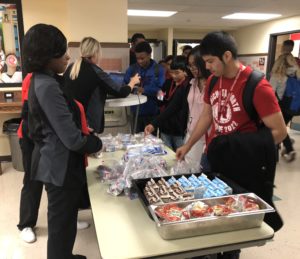 Many Wichita residents do not have access to healthy foods, with many living in the 44 square miles of food deserts. The Hurdles to Healthy Food Access assessment was commissioned to explore the barriers to healthy food consumption. The study included community engagement and key-informant interviews with residents of specific zip codes, chosen for their comparatively low median income levels and lack of availability of healthy and affordable food sources. The study identified six common factors of living in a low-healthy-food-access area.
Many Wichita residents do not have access to healthy foods, with many living in the 44 square miles of food deserts. The Hurdles to Healthy Food Access assessment was commissioned to explore the barriers to healthy food consumption. The study included community engagement and key-informant interviews with residents of specific zip codes, chosen for their comparatively low median income levels and lack of availability of healthy and affordable food sources. The study identified six common factors of living in a low-healthy-food-access area.
To address the factors identified in the study, the Health & Wellness Coalition of Wichita (HWC) established a Food Policy Committee to engage the community in addressing food equity issues in Wichita. The Food Policy Committee advocates for policies that increase access to healthy foods, hosts community events, and develops programs that encourage healthy eating.
One focus of the committee has been partnering with schools to launch several initiatives aimed at providing breakfast to students who 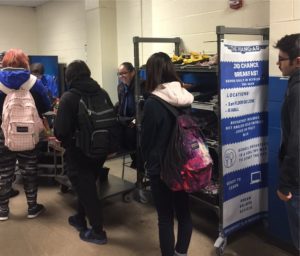 otherwise may miss the most important meal of the day. Schools have since expanded breakfast offerings to include extended serving times in cafeterias, grab-and-go breakfasts from carts or kiosks, and “second-chance breakfast,” in which students are offered breakfast after homeroom or first period. The school district is serving about 1,100 more breakfasts each day – a 45% increase.
otherwise may miss the most important meal of the day. Schools have since expanded breakfast offerings to include extended serving times in cafeterias, grab-and-go breakfasts from carts or kiosks, and “second-chance breakfast,” in which students are offered breakfast after homeroom or first period. The school district is serving about 1,100 more breakfasts each day – a 45% increase.
The Food Policy Committee is also collaborating with residents, community partners, and experts to develop a Master Food Plan that will provide guidance on food policy issues.
3.) League 42 and Open Streets ICT
Wichita has experienced widespread growth on its fringes and, as a result, City Center has suffered. League 42 and Open Streets ICT are two of the efforts aimed at reinventing and reinvesting in City Center.
League 42
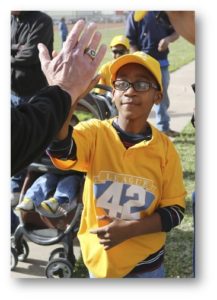 McAdams Park rests in the heart of Wichita’s African-American community and during the time of racial segregation, served as a destination for racial minorities to swim, golf, and play baseball. Decades later, the park fell into a state of disrepair.
McAdams Park rests in the heart of Wichita’s African-American community and during the time of racial segregation, served as a destination for racial minorities to swim, golf, and play baseball. Decades later, the park fell into a state of disrepair.
A handful of community leaders convened to discuss returning McAdams Park to its glory days. The plan focused on reintroducing inner-city youth to baseball. Community leaders organized as a non-profit, established a board of directors, recruited volunteers, and formed League 42, named after baseball legend Jackie Robinson, who wore the number 42.
Today, League 42 introduces youth baseball and provides structure and support through mentoring and education opportunities. In fewer than five years, League 42 has grown to more than 600 players and 50 teams.
Open Streets ICT
In 2016, a team of business, community, and government representatives thought that a public street would be a great way to unite the community, promote health and wellness, and have a great time. The result was Open 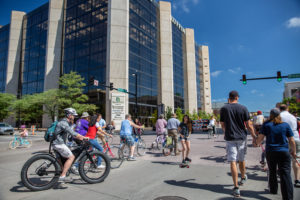 Streets ICT, a free place-making event that closed a four-mile stretch of a major city streets to motorized vehicles and opened the street to community building, music, food, biking, outdoor recreation, and dancing. Residents were encouraged to join in the fun by visiting local businesses, restaurants, street vendors, and five major activity hubs.
Streets ICT, a free place-making event that closed a four-mile stretch of a major city streets to motorized vehicles and opened the street to community building, music, food, biking, outdoor recreation, and dancing. Residents were encouraged to join in the fun by visiting local businesses, restaurants, street vendors, and five major activity hubs.
Some Related Posts
Thank You to Our Key Partners



